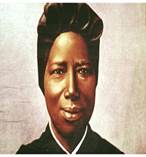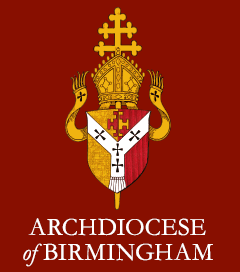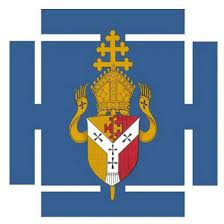Bakhita
BAKHITA (Yellow) ‘Be strong do not fear’

Imagine being snatched from your family when you were between the ages of 7 and 9 then forced to walk 600km while being treated most cruelly on the way. This is what happened to Bakhita. She came from a large, happy family, with four brothers and three sisters. Slave traders had kidnapped one of her older sisters some years before w hen Bakhita was still very small. Bakhita's family were reasonably well off. Her uncle was the bribal chief. Her father owned cattle and a plantation. It was from this happy family and childhood that Bakhita was torn and the trauma of her kidnapping was so severe that she forgot her name. Bakhita, which means “lucky” or “fortunate” was the name given to her by her kidnappers but there was nothing lucky about Bakhita’s early experiences. She was sold twice before they reached their destination. Her third and fourth owners were particularly cruel, one subjecting her to frequent lashings with a whip that tore her flesh, the other had her scarified and tatooed. This involved tracing intracite patterns on her body with flour, then cutting them with a razor and rubbing salt into the wounds to ensure scarification was permanent. In all Bakhita had about 114 cuts on different parts of her body. The mistress of the house stood by with a whip ready in hand in case Bakhita struggled too hard.
Eventually Bakhita was sold to an agent of the Italian Consul, who treated her well. On his return to Italy he gave Bakhita as a present to a friend of the family. He, too, and his family treated Bakhita well and she acted as a nursemaid to their daughter. However, his business interests took him back to the Sudan. While he and his wife were sorting out a place to live they left Bakhita and their daughter with a community of Sisters. Here Bakhita found peace and calm so that when the time came to leave she refused. For three days her owners tried in vain to get her to leave the Convent. The Sisters supported Bakhita and contacted the Italian authorities who declared that as slavery was banned in Italy, and had been banned in the Sudan before Bakhita was born, legally Bakhita had never been a slave. So Bakhita at the age of 21 was a free woman.
Bakhita was baptised – taking the name Josephine – made her first communion and after years of prayer and study joined the community that had befriended her. They were known as the Canossian Sisters. Bakhita was very happy and spent the rest of her life helping others. In 1935 she was asked to talk about her faith story and to help missionaries in their work in Africa. When asked what she would do if she met her captors she replied that she would kiss their feet because through them she had found God.
In 1938 her health began to fail but she accepted this with serenity, confident of God's love for her. In her last illness her experience of slavery seemed to return and she was heard to murmur, "Please loosen the chains they are too tight". However her last words were "Yes I am so happy, Our Lady, Our Lady".
Bakhita died in 1947 and in 2000 Pope John Paul II declared her a saint and the patron saint of Sudan. Pope Benedict XVI on the 30th November 2007 in the beginning of his second encyclical "Spe Salvi" (in hope we were saved) related Bakhita's entire life story as an outstanding example of Christian hope. Sadly the suffering of the people of Sudan continues. The Northern Sudanese word for a southerner is slave.





